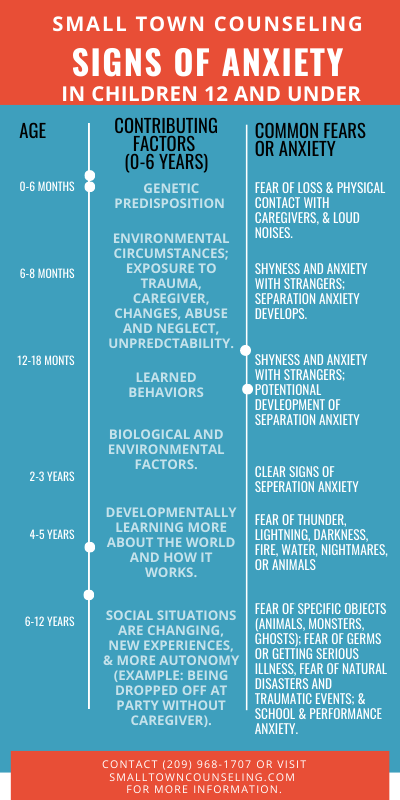
Is Anxiety Normal in Young Children?
Yes, experiencing anxiety is normal, even when very young. It’s one of the most common mental health issues in the US. A simple definition for anxiety is apprehensive uneasiness or nervousness usually over an impending or anticipated bad thing. Anxiety is a typical part of life and often considered a positive expression of emotion. Small amounts of it can help motivate achievement, avoid getting in trouble, or encourage problem-solving in children. Our brain is wired to have a built-in response to avoid painful or harmful situations, otherwise we’d be in danger often. It’s our fight, flight, or freeze system that determines how we react to real or perceived fear. As adults, we’ve developed reactions we’re aware of, but children may be experiencing emotions for the first time and not understand what’s going on or be able to make connections to anxiety.
When Anxiety Becomes a Problem
When a child feels disproportionate amounts of anxiety to something, especially if persistent, then it can negatively affect their everyday experiences. Data for children from the Center for Disease Control indicates 7.1% of children aged 3-17 years (approximately 4.4 million) were diagnosed with anxiety and the rate of anxiety has risen significantly from 2007 – 2012. Recent research shows a further rate increase with spikes occurring during the school year. Our children are stressed in many ways, such as dealing with COVID-19 pandemic, social challenges, academics, physical changes and development, social media and its influence, wanting to fit in and be accepted, and the 24-hour news cycle focused on negative headlines. It’s no wonder our children are showing signs of anxiety, but do you know what signs you should be looking for? You might be surprised.
Common Developmentally Appropriate Fears & Anxiety by Age Groups
Let’s look at common fears and anxieties are to avoid becoming overly worried about our kid’s development. Please see age-group information in the graph below.

When Should Parents be Concerned About Anxiety?
Now that we’ve talked about what’s common, let’s look at when we should be concerned as parents. In looking at behaviors, be aware of what is typical for your kid; some children have a higher baseline anxiety level than others. Especially note things that seem out of the ordinary and are causing avoidance or extreme distress for your children. Let’s break down what’s important to recognize.

Everything presented here is intended to help gauge where you feel your child is at; you know them better than anyone. If you feel something is wrong, get more information to best support your children.
Don’t miss our next blog on Most Common Anxiety Types for Children: What to Do and What Not to Do.

Am I Worrying Too Much or Does my Young Child Have Anxiety? Signs Parents Need to Know is written by David Cayton, M.A, M.S.. David has experience as an academic advisor, education-based research assistant, student affairs Assistant Director at colleges and universities, and mental health professional working with children, teens, and professionals. At the time of this publishing, David Cayton is Trainer and Research Associate at Small Town Counseling® a group mental health practice located in California that helps individuals, groups, and organizations in promoting mental wellness and education on trauma and anxiety through mental health services and training.
More Information
For more information on Small Town Counseling services for children and teens, what to expect, and/or scheduling an appointment check out our Child and Teen Counseling Services or call 209-968-1707. FAQs and resources for anxiety are available in our Good Reads! For additional parenting resources visit Parenting Resources.
